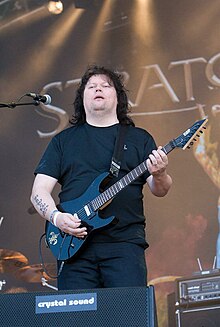Classical Variations 2: Credo
| Timo Tolkki | |
|---|---|

Tolkki performing with Stratovarius in 2007
|
|
| Background information | |
| Birth name | Timo Tapio Tolkki |
| Born |
3 March 1966 Nurmijärvi, Finland |
| Genres | Power metal, progressive metal, neoclassical metal, heavy metal, instrumental rock |
| Occupation(s) | Musician, songwriter, producer |
| Instruments | Guitar, bass, vocals |
| Years active | 1984–present |
| Labels | Nuclear Blast, Sanctuary |
| Associated acts | Stratovarius, Revolution Renaissance, Symfonia, Avalon, Allen-Lande |
| Website | tolkki |
Timo Tapio Tolkki (born 3 March 1966) is a Finnish musician best known as the former guitarist, songwriter and producer of the power metal band Stratovarius. With his tenure lasting for more than twenty years, he was the longest standing member of the band before his departure in 2008. After leaving Stratovarius he formed two supergroups named Revolution Renaissance and Symfonia, both of which have since disbanded. In a 2011 article by Guitar World magazine, Tolkki was included in the all-time top 50 list of fastest guitar players in the world.
Tolkki started playing guitar at the age of seven and practiced intensely, sometimes eight hours a day. When he was twelve years old, his father committed suicide by jumping from the fourth floor of his apartment.
Before joining Stratovarius in 1984, Tolkki had played with the bands Antidote, Thunder and Road Block. At the beginning of his career with Stratovarius, he served as vocalist as well as handling all lead and rhythm guitars, and at times bass guitar (until Jari Kainulainen's arrival in 1993). After the band's third album, Dreamspace (1994), Tolkki handed over vocal duties to Timo Kotipelto, who took over from Fourth Dimension (1995) onwards. This was largely due to Tolkki's desire to evolve the overall musical direction of the band and concentrate on his guitar work. Further changes were made after Dreamspace, including the departure of the remaining original members of the band, keyboardist Antti Ikonen and drummer Tuomo Lassila, due to creative differences.
In 1994, Tolkki released his first solo album, Classical Variations and Themes, which had at the time been one of his longtime ambitions. The album was similar to his work with Stratovarius, but with more focus on primarily instrumental compositions. His second solo album, Hymn to Life (2002) showed a more personal side, dealing with such emotional issues as his relationship with God and his late father.
...
Wikipedia
